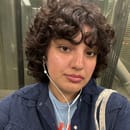Across the ages, music has served as a tool for spreading cultural awareness, building allyship, and promoting liberation. Especially in our time of white-dominated LGBTQ+ media, representation of queer racial and ethnic minorities matters.
Pride month comes around only once a year, but it’s always the right time to explore queer artists. While I respect the craft of Girl in Red and King Princess, I connect more deeply with musicians of color whose art reflects intersectional experiences. From my digital library to yours, here are 4 sapphic singers to add to your playlists!
RINA SAWAYAMA
A Japanese-British self-proclaimed ordinary superstar, Rina Sawayama melds rock, metal, and pop to tell her story. Her 2018 pop-perfection single “Cherry” describes a subway crush whose suggestive “girl gaze” triggers an internal conflict within Sawayama before she comes to terms with being pansexual. It’s empowering and refreshing, much like the Sawayama deluxe track “LUCID”, which explores lust and infatuation. Released in 2022, “This Hell” is another unapologetic queer anthem that satirizes homophobia and transphobia, embracing the threat of eternal damnation and uniting the community.
However, Sawayama’s experimental music grapples with self-identity beyond sexuality; she also confronts generational pain, cultural disconnect, gendered insecurities, and even capitalism. In a 2020 interview with the online magazine Enfnts Terribles, she reflects on being an immigrant in London as a child, expressing that her work represents “the intersection between Japan and the Western world”. With an extraordinary discography ranging from sultry sapphic jams to songs about family conflict, it’s clear that Sawayama values diversity in her artistry.
KEHLANI
Idyllic and sensual, Kehlani’s third studio project, Blue Water Road, is the first they released as an out nonbinary lesbian. Intimate soul ballads “melt” and “tangerine” compliment flirtatious bangers “up at night” and “more than i should” — all of which encapsulate the euphoria of entering a healthy queer relationship. “When you’re not playing into a certain gaze,” they explain in an interview with The Face Magazine, “everything really does change”.
Although they consider Blue Water Road their “first gay album”, Kehlani has identified as queer since the beginning of their career. Sapphic tunes sprinkle their R&B catalog, including sweet summery songs about falling for women (“Honey”) and hungry heartbreak hits (“Nights Like This”). Having collaborated with other Black queer artists like Megan Thee Stallion, Syd, and Victoria Monét, she has solidified her lesbian icon status in the music industry.
RAVEENA
“God, I love my women / Let’s all become farmers,” Raveena proposes in “Kismet”, the fourth track on her 2022 sophomore album. Inspired by nostalgic Bollywood music, Asha’s Awakening honors Raveena’s heritage, sensuality, and spirituality. She integrates Indian instruments into her melodic odes, singing in both Hindi and English. At the end of the record, her saccharine voice guides listeners through a 13-minute meditation, “Let Your Breath Become a Flower”.
Raveena came out as bisexual with her 2018 release of “Temptation”, a soothing celebration of sapphic love and femininity. Another dreamy song about a girl, “Headaches” details a blissful whirlwind romance. On her cultural background, the R&B singer tells V Magazine, “I grew up in a very immigrant household. I feel like I’m learning to incorporate these two worlds into my work”. The seamless blends of South Asian and Western influences in her music reflect this desire for balance. Lucid, her debut project, also deals with healing generational wounds and practicing self-contentment. Soulful and sincere, Raveena wears her heart on her sleeve.
KIANA LEDÉ
Featuring Kehlani, Kiana Ledé’s first explicitly sapphic release is her cheeky 2021 single, “Ur Best Friend”. Singing from the perspectives of two acquaintances with unspoken tension, the pair eventually pursue an illicit affair and betray the man who introduced them. While she clarifies that “Ur Best Friend” was not inspired by a real-life experience, “Promise Me” on her 2023 R&B album Grudges is a flirty and seductive track about Ledé’s attraction to all genders.
In a 2020 Refinery29 interview about her self-exploration journey, she describes feeling out of place as a young multiracial person before learning to accept herself: “I am a Black girl, I am a Mexican girl, I am a Native girl. My experience is my experience”. Vulnerable and empowering, the artist’s self-assured attitude shines through her dazzling discography – after all, two of her projects are titled Myself and Kiki. Embracing her racial identity, her sexuality, and, of course, her grudges, Ledé’s queer confidence and authenticity is contagious.
As a contemporary music consumer, I’m constantly delving into the discographies and, admittedly, the Wikipedia pages of new artists I discover. Learning about their identities provides a meaningful context for their work while also allowing me to feel represented by pieces of art that are, essentially, pieces of history.
Rina Sawayama, Kehlani, Raveena, and Kiana Ledé are all wonderfully talented, but it is worth noting that people of color are not monolithic. Although their music resonates with me, someone else may feel differently. Fortunately, we’re approaching a future where more queer people of color will be taking up space in our society — whether they be in entertainment, education, or law. And as the music industry diversifies, so will my Spotify.


